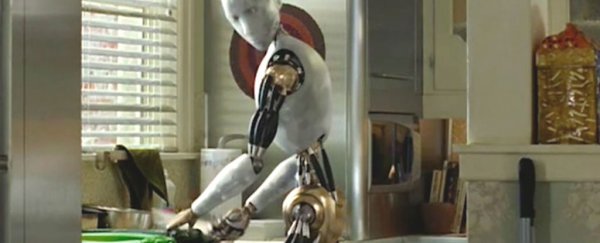For most people, housework is the absolute worst, and it's kinda weird how in 2016, we still don't have anything remotely like Rosie the robot maid, who vacuumed the hell out of the Jetsons' house.
Well, it might finally be our time, because multitasking entrepreneur Elon Musk just announced that his new robotics firm, Open AI, will be developing 'domestic robots' that can perform basic household chores.
To accelerate the process, Open AI will be developing the robots based on technology that already exists - basically, it's going to be taking off-the-shelf robots and customising them to do housework.
"There are existing techniques for specific tasks, but we believe that learning algorithms can eventually be made reliable enough to create a general-purpose robot," Open AI says in a blog post.
Open AI launched back in December 2015, and is headed up by Musk and Sam Altman, president of Y Combinator - a US company that provides seed funding for startups. Since then, it's secured US$1 billion in funding from tech heavy-hitters such as PayPal cofounder Peter Thiel.
The idea behind the non-profit is to bring artificial intelligence to our everyday lives, rather than keeping it locked up in robotics labs around the world.
"We believe AI should be an extension of individual human wills and, in the spirit of liberty, as broadly and evenly distributed as is possible safely," the company announced at its launch.
Building a viable chore-bot is just one of Open AI's goals, another is to build a robot with a useful and natural understanding of language.
Basically, they say the robots of today can understand certain, very specific questions and commands, but real intelligence is being able to ask for clarification and figure out if what's being asked of it practical, safe, and non-ambiguous.
Progress is being made in this field, with this incredibly creepy robot almost holding its own in an existential conversation with a visibly bemused journalist, and this little guy, which is being taught to only follow instructions from humans if they don't put it in danger. So researchers are pretty much figuring out how to troll-proof their robots.
"Today, there are promising algorithms for supervised language tasks such as question answering, syntactic-parsing and machine translation but there aren't any for more advanced linguistic goals, such as the ability to carry a conversation, the ability to fully understand a document, and the ability to follow complex instructions in natural language," says Open AI. "We expect to develop new learning algorithms and paradigms to tackle these problems."
They should have a chat to Microsoft's temporarily decommissioned chatbot Tay, but not for too long, in case she starts outing the Zodiac killer and asking for that sweet 3-inch-floppy.
The final goal for Open AI right now is solve a wide variety of games, such as chess, Go, and the Rubik's cube, using a single robot.
This all sounds great, and like most of what Musk does, including trying to get humans to Mars, and making renewable energy more available to the average person, we're all in. Hopefully it doesn't backfire with our chorebots getting all stabby on us, but if anyone's going to do this cautiously, it's Musk.
"I think we should be very careful about artificial intelligence," he said during an MIT symposium back in 2014. "If I were to guess at what our biggest existential threat is, it's probably that… With artificial intelligence, we are summoning the demon."
